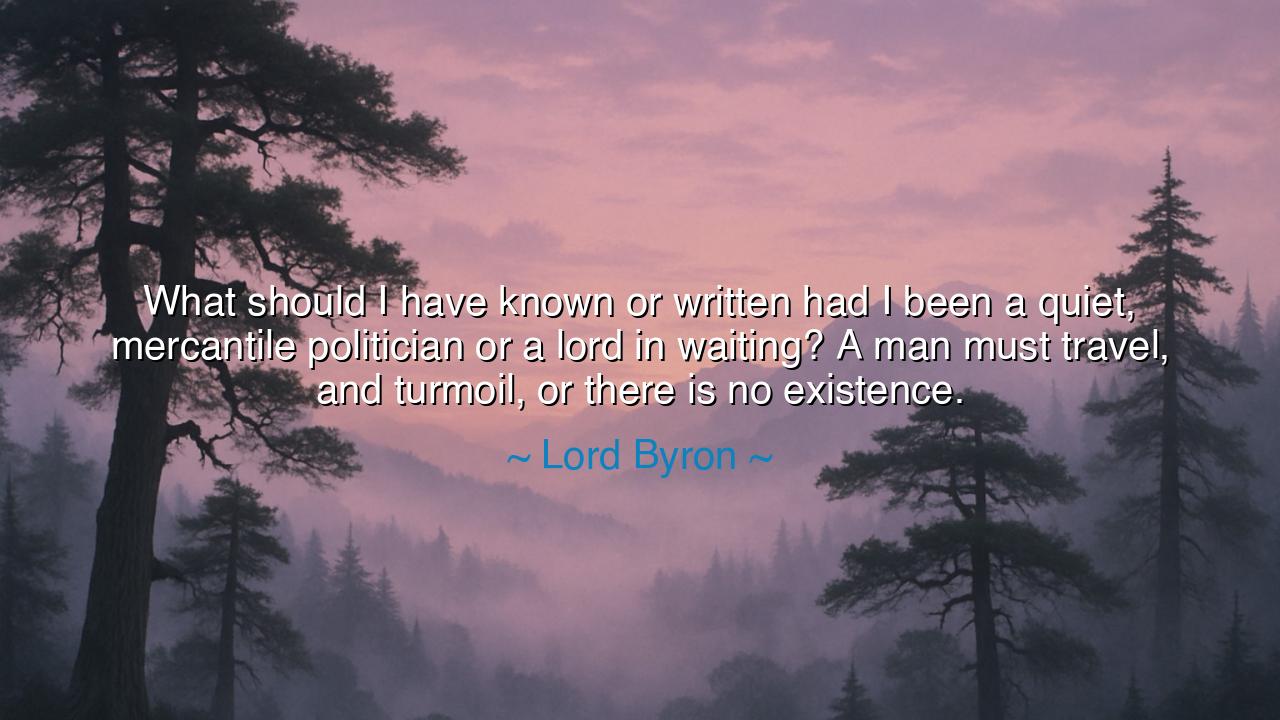
What should I have known or written had I been a quiet
What should I have known or written had I been a quiet, mercantile politician or a lord in waiting? A man must travel, and turmoil, or there is no existence.






In the words of Lord Byron: “What should I have known or written had I been a quiet, mercantile politician or a lord in waiting? A man must travel, and turmoil, or there is no existence.” These words rise not merely as the musings of a poet but as a thunderous cry of defiance against the dullness of a life without struggle, without wandering, without risk. Byron, who lived as passionately as he wrote, declares here that existence itself is barren without motion and storm, without the restless search for meaning across the roads of the world.
The origin of this quote lies in Byron’s own tempestuous life. Born into nobility, he could have chosen ease, wealth, and the safe ambitions of politics or courtly life. Yet he rejected such stillness, casting himself into the world of travel, passion, and rebellion. From the glittering salons of Europe to the battlefields of Greece, Byron sought turmoil as fuel for his poetry and his spirit. He believed that a man of letters, to write with depth and fire, must not merely observe the world from a throne of comfort but must plunge into its chaos and feel its storms in his very blood.
Byron’s cry echoes the wisdom of the ancients. Consider Odysseus, who could have remained in Ithaca, a quiet lord content with his land and family. But fate—and his own restless spirit—drew him into the turmoil of war and the wanderings of the sea. From those travels came not only the shaping of his character but the immortal stories that still guide us today. Byron’s own life mirrored this truth: his verses, filled with passion, rebellion, and longing, could not have been born from stillness. They required the friction of conflict, the experience of danger, the weight of sorrow and triumph.
This truth resounds in history as well. Alexander the Great could have remained a Macedonian prince, content with inherited lands. But he chose to journey across continents, meeting turmoil at every horizon, and in so doing carved a legacy that reshaped the known world. Likewise, explorers such as Magellan or Columbus braved storms and mutiny, for they knew that discovery lay not in safety but in venturing beyond what was known. Byron stands among them, not as conqueror of land, but as conqueror of words, whose poetry gained its depth because he embraced the storms of life.
The deeper meaning of Byron’s declaration is this: comfort is the enemy of creation. The man who seeks only peace, who flees turmoil, who sits quietly among possessions and honors, may live long, but he will not live fully. Existence, in Byron’s eyes, demands both travel and struggle. Travel to expand the mind beyond its narrow walls; turmoil to awaken the heart and teach it strength. Without these, life is but a shadow, a faint echo, a pale imitation of what it could be.
The lesson for us is clear: do not hide from the storms of life, nor cling only to safety. Seek the journey, embrace the turmoil, and let them shape you. If you wish to write, to create, to live with meaning, you must be willing to step into the unknown. The world is not meant to be watched from behind glass, but to be touched, felt, and endured. It is through the trials, the wanderings, and the upheavals that wisdom is born.
In practice, this means saying yes to the paths that scare you, to the journeys that disrupt your comfort, to the challenges that demand your courage. Travel beyond your familiar borders—not only across lands but across ideas, across the boundaries of your own fear. And when turmoil comes, do not curse it as misfortune alone, but see it as Byron did: as the fire that makes existence real, the tempest that forges the soul.
Thus, Lord Byron’s words become a teaching for the ages: to live is to move, to struggle, to wander, and to endure. Do not seek a life of stagnant peace, for such a life is no life at all. Instead, rise like the wanderer, step into the storm, and let your existence be carved by the roads you travel and the turmoil you overcome. For in these, and only in these, will your spirit taste the fullness of life.






AAdministratorAdministrator
Welcome, honored guests. Please leave a comment, we will respond soon